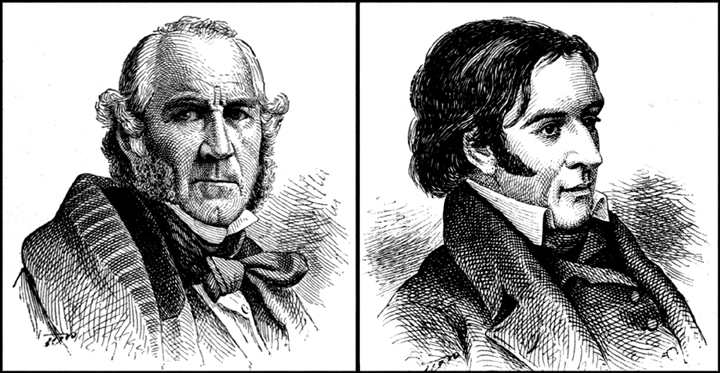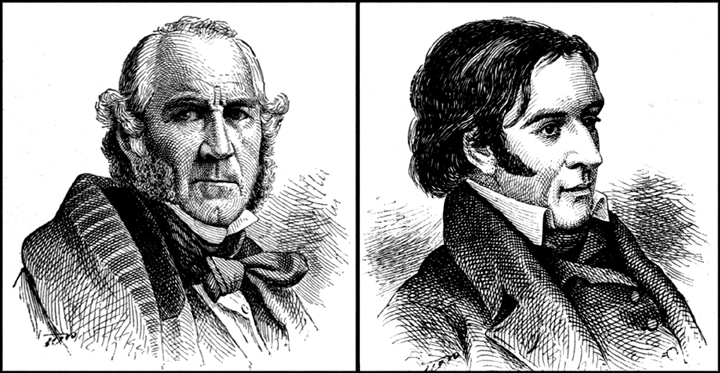One of my favorite writers, the late Hal Boyle, former Associated Press writer, questioned in a July 1955 column if Davy Crockett was really “King of the Wild Frontier.” “Davy Crockett, king of the wild frontier?” he wrote. “Why, man, there are people here in Davy's old home state who’ll tell you he was nothing but a wet-eared boy in an oversized coonskin cap compared to Sam Houston.
Davy died in the Alamo, but Big Sam, who spent his youth here, was an even greater soldier and statesman and led Texas into the union.”

Sam Houston (left), Davy Crockett
Boyle wondered what Texas would be like today if it hadn't been for Sam Houston (and oil wells, of course). The youthful Sam might have been judged a juvenile delinquent by modern standards. Mrs. Boyd McKenzie, who once taught school in Tennessee, did not consider Davy to be in the same league with Sam as a frontier hero. According to her, Crockett would be almost unheard of had it not been for Walt Disney's popular movies of him in the 1950s.
“Mrs. McKenzie was the descendant of a family who owned land next to the farm on which Sam Houston’s widowed mother settled in Tennessee. She made the trek here from Virginia with her nine children. She related that young Sam was an avid reader, but disinclined to farm chores. He once tried to run away and live with the Cherokee Indians who named him “The Raven.” According to Mrs. McKenzie, “He was picked up for drunkenness at the age of 18. He walked up and down the streets beating a drum and was charged with disturbing the peace.”
Then things changed. “During the next year he opened a school to pay off debts totaling $100 – a sizable chuck of change in those days, said Mrs. McKenzie. “He amassed the bill by buying presents for his mother and a few Indian maidens.” Although the previous teachers had charged $6 a semester tuition, Sam raised it to $8 and insisted that one-third be paid in cash.” His pupils ranged in age from 6 to 60 years. So many came that he had to turn several away.”
Houston’s teaching career was brief. He ran up more bills, as he himself later admitted, by unruly living. In March 1813, a recruiting officer came to town. He beat on a drum and shouted, “Hear ye; hear; if ye want to join General Jackson's army to fight the savage Indian, come and take a dollar from the drumhead, and this will enroll ye.” Sam, egged on by a friend, stepped up, took his dollar and instantly became a soldier.
Life changed dramatically for Sam Houston. His military and political affiliation put him on a momentous trail. He became a governor of Tennessee. He later commanded the Army of Texas, led the Republic of Texas and served as a United States senator and governor of Texas after it entered the union.
Houston was ousted as governor when he opposed the entrance of Texas into the Confederacy. He died in 1863 at the age of 70, with the fate of national union still unsettled.
During Sam's final years, he was asked what was his life’s greatest pleasure. He responded that it was being a schoolteacher during the rough times of his youth. He reflected blissfully on the simple old schoolhouse, weathered by 161 years of service to its youth that was still standing. He noted that wealthy Texans had tried to purchase it and relocate it to the Lone Star State, but the Volunteer State wasn’t about to get rid of it.
Boyle offered a final note: “In 1924, a pair of ancient lead knuckles with Sam Houston's name scratched on them was found hidden above the doorway of the school. Perhaps young Sam enforced discipline on his pupils with lead knuckles? That was not likely because he stood 6 feet 6 inches tall and weighed 200 pounds when he was only 18-years-old, big enough to handle even Davy Crockett.”
I personally think Hal was a bit rough on our “King of the Wild Frontier,” but the writer’s work provides a fresh look at Houston. There can be no doubt that both men displayed strong leadership and were a tremendous asset to Tennessee and to our nation. I bet Sam Houston never killed a bear when he was only three.

Comments are closed.